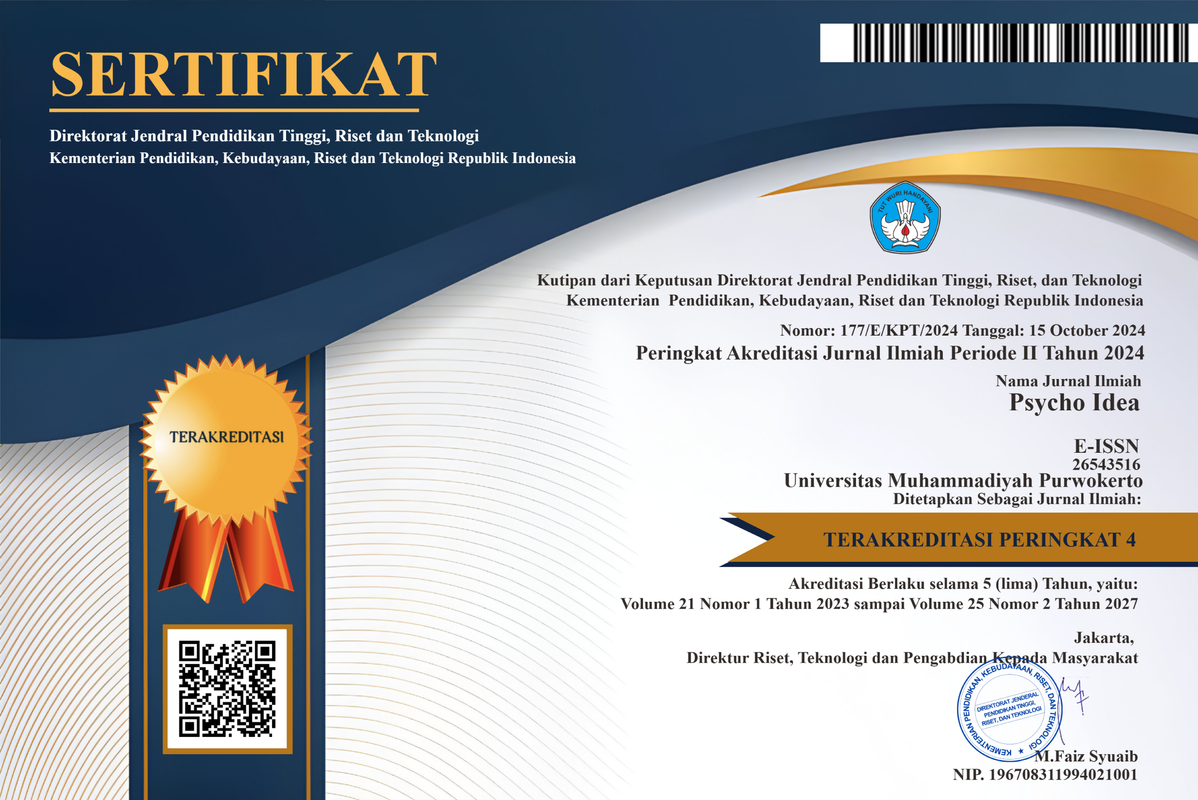Terapi Singkat Berfokus Solusi untuk Meningkatkan Kemampuan Penetapan Tujuan pada Narapidana yang Menjelang Bebas di Lembaga Pemasyarakatan
DOI:
https://doi.org/10.30595/psychoidea.v18i1.5919Keywords:
penetapan tujuan, terapi singkat berfokus solusi, narapidana menjelang bebasAbstract
Narapidana yang menjelang bebas cenderung mengalami masalah psikologis. Masalah ini disebabkan kekhawatiran dalam menghadapi masa depan yang tidak jelas dan sulitnya mendapatkan pekerjaan setelah bebas. Memiliki tujuan seperti mendapatkan pekerjaan yang diinginkan, ingin membahagiakan keluarga, ingin meraih cita-cita setelah bebas dapat meningkatkan optimisme dan perasaan positif menjelang bebas. Penelitian ini bertujuan untuk menguji efektivitas terapi singkat berfokus solusi untuk meningkatkan penetapan tujuan narapidana menjelang bebas di Lapas. Metode penelitian yang digunakan adalah penelitian ekspresimen one group pretest-posttest design. Subjek penelitian adalah narapidana menjelang bebas sebanyak 13 orang. Instrumen yang digunakan adalah skala personal goal setting dari Brunstein (1993) yang berfungsi untuk mengukur penetapan tujuan sebelum dan sesudah diberikan intervensi. Hasil penelitian menunjukkan adanya perbedaan skor pretest dan posttest dengan sig. 0,022 (< 0,05) yang berarti bahwa terapi singkat berfokus solusi dapat meningkatkan kemampuan penetapan tujuan narapidana menjelang bebas di Lapas.Â
References
Bartol, C. L. (1994). Psychology and Law. California: Wadsworth Inc.
Berg, I. (2008). Interviewing for solutions. Belmont: Thompson.
Brunstein, J. C. (1993). Personal goals and subjective well-being: A longitudinal study. Journal of personality and social psychology, 65(5), 1061.
Cochran, W., & Tesser, A. (1996). The “what the hell” effect: Some effects of goal proximity and goal framing on performance. Striving and feeling: Interactions among goals, affect, and self-regulation, 99-120.
De Shazer, S., Dolan, Y., Korman, H., Trepper, T., McCollum, E., & Berg, I. (2007). More Than Miracles The State of the Art of Solution-Focused Brief Therapy. New York: The Haworth Press, Inc.
Doekhie, J., Dirkzwager, A., & Nieuwbeerta, P. (n.d.). Early attempts at desistance from crime: Prisoners’ prerelease expectations and their postrelease criminal behavior. Journal of Offender Rehabilitation, 56(7), 473-493.
Douglas, K. S., Vincent, G. M., & Edens, J. F. (2006). Risk for criminal recidivism: The role of psychopathy.
Duwe, G. (2017). The use and impact of correctional programming for inmates on pre-and post-release outcomes. US Department of Justice, Office of Justice Programs, National Institute of Justice.
Grégoire, S., Bouffard, T., & Vezeau, C. (2012). Personal goal setting as a mediator of the relationship between mindfulness and wellbeing. International Journal of Wellbeing, 2(3), 236 -250.
Hafida, A.N. Pengaruh faktor risiko dan protektif terhadap resiliensi pada klien pemasyarakatan di bali pemasyarakatandi bali pemasyarakatan kelas I Surabaya. (Skripsi tidak dipublikasikan). Fakultas Psikologi Universitas Airlangga, Surabaya.
Kenemore, T. K., & Roldan, I. (2006). Staying straight: Lessons from ex-offenders. Clinical Social Work Journal, 34(1), 5-21.
Lindforss, L., & Magnusson, D. (1997). Solution-focused therapy in prison. Contemporary Family Therapy, 19(1), 89-103.
Locke, E. A., & Latham, G. P. (2006). New directions in goal-setting theory. Current directions in psychological science, 15(5), 265-268.
Locke, E., & Latham, G. (1990). A theory of goal setting & task performance. Englewood Cliffs: Prentice Hall, Inc.
Markson, L., Lösel, F., Souza, K., & Lanskey, C. (2015). Male prisoners’ family relationships and resilience in resettlement. Criminology & Criminal Justice, 15(4), 423-441
Priyatno, D. (2009). Sistem Pelaksanaan Pidana Penjara di Indonesia. Bandung: PT Refika Aditama.
Sari, L. L., & Nuqul, F. L. (2017). Pengaruh harapan terhadap kecenderungan residivis pada narapidana. Idea: Jurnal Psikologi, 35-40.
Sharry, J. (2001). Solution-Focused Group Work. London: Sage.
Stander, I. (2003). The impact of solution-focused brief therapy on young youth offenders. (Tesis tidak dipublikasikan). Counselling Psychology Stellenbosch University, Stellenbosch.
Tripodi, S., Kim, J., & Bender, K. (2010). Is employment associated with reduced recidivism? The complex relationship between employment and crime. International Journal of Offender Therapy and Comparative Criminology, 54(5), 706-720.
Vernick, S. H., & Reardon, R. C. (2001). Career development programs in corrections. Journal of Career Development, 27(4), 265-277.
Walker, L. (2008). Implementation of Solution-Focused Skills in a Hawai'i Prison. In P. D. Jong, & I. Kim Berg, Interviewing For Solutions. Belmont: Nelson Education.
Walker, L. (2008). Implementation of solution-focused skills in a Hawai'i Person. In P. De Jong, & I. Kim Berg, Interviewing for solutions (pp. 302-308). Belmont, CA: Thompson/Brookscole.
Walker, L. (2010). Huikahi Restorative Circles: Group Process for Self-Directed Reentry Planning and Family Healing. European Journal of Probation, 2(2), 76-95.
Widiantoro, W. (2006). Kecemasan Narapidana Saat Menghadapi Masa Menjelang Bebas (Studi Kasus Pada Narapidana Di Lembaga Pemasyarakatan Kelas 1 Sukamiskin Bandung). (Skripsi tidak dipublikasikan). Fakultas Psikologi Universitas Sanata Dharma, Yogyakarta.
Downloads
Published
Issue
Section
License
Authors published in this journal agree to the following terms:
- The copyright of each article is retained by the author (s) without restrictions
- The journal allows the author(s) to retain publishing rights without restrictions
- The author grants the journal the first publication rights with the work simultaneously licensed under the Creative Commons Attribution License, allowing others to share the work with an acknowledgment of authorship and the initial publication in this journal.
- Authors may enter into separate additional contractual agreements for the non-exclusive distribution of published journal versions of the work (for example, posting them to institutional repositories or publishing them in a book), with acknowledgment of their initial publication in this journal
- Authors are permitted and encouraged to post their work online (For example in the Institutional Repository or on their website) before and during the submission process, as this can lead to productive exchanges, as well as earlier and larger citations of published work
- Articles and all related material published are distributed under a Creative Commons Attribution-4.0 International Public License (CC - BY 4.0).
License
Psycho Idea is licensed under a Creative Commons Attribution- 4.0 International Public License (CC - BY 4.0).
You are free to :
Share — copy and redistribute the material in any medium or format
Adapt — remix, transform, and build upon the material for any purpose, even commercially











